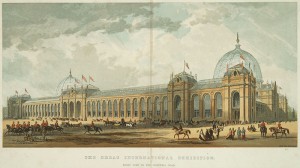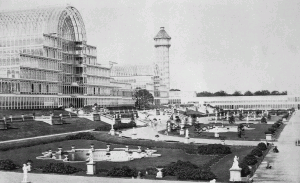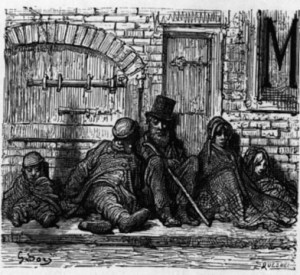 Dostoevsky left St Petersburg for his first trip to Europe on 7th June 1862. He spent most of his time in France and Italy, but also visited London for 8 days – his only trip to Britain – arriving on 9th July (Dryzhakov, p. 328). Like many other writers, one of his chief aims was to see Herzen, and he certainly did so on 16th July, as well as probably also on Sunday 11th. According to Frank, the two men, who found they had a great deal more in common than they had on their previous meeting, in 1846, discussed recent events: Chernyshevsky’s arrest, the spate of fires that had engulfed Petersburg that spring, and the revolutionary Young Russia proclamation that had been published to much furore in May (Frank, pp. 145-59, 188-92). Given the closeness of Herzen’s circle, and his habit of entertaining on Sundays at Orsett House, it seems likely that on 11th July, Dostoevsky also met Bakunin and Ogarev.
Dostoevsky left St Petersburg for his first trip to Europe on 7th June 1862. He spent most of his time in France and Italy, but also visited London for 8 days – his only trip to Britain – arriving on 9th July (Dryzhakov, p. 328). Like many other writers, one of his chief aims was to see Herzen, and he certainly did so on 16th July, as well as probably also on Sunday 11th. According to Frank, the two men, who found they had a great deal more in common than they had on their previous meeting, in 1846, discussed recent events: Chernyshevsky’s arrest, the spate of fires that had engulfed Petersburg that spring, and the revolutionary Young Russia proclamation that had been published to much furore in May (Frank, pp. 145-59, 188-92). Given the closeness of Herzen’s circle, and his habit of entertaining on Sundays at Orsett House, it seems likely that on 11th July, Dostoevsky also met Bakunin and Ogarev.
Conforming to what is becoming an pattern for this series, Dostoevsky hasn’t left us a great deal material about his visit. The only extended record is his travel notes, Winter Notes on Summer Impressions. This is a strange text in many ways, being far more about Russia than it is about Europe. As travel notes it’s pretty hopeless – Italy is entirely ignored and Germany is only mentioned to tell us he forgot to notice it. When it does concern itself with the author’s surroundings, it’s almost entirely negative. So it comes as no surprise that London doesn’t fare too well in his description.
The title of the London chapter, ‘Baal’, says it all. As I’ve discussed in a previous post, Dostoevsky refers to the ‘Crystal Palace, the International Exposition’ as a ‘terrible force that has united all the people here, who come from all over the world, into a single herd’ (p. 37).
His description seems to amalgamate Joseph Paxton’s Crystal Palace at Sydenham and the 1862 International Exhibition in South Kensington, and it’s not clear whether he visited one or both of them (although as I’ve suggested in another post, not entirely seriously, he may have been inspired to write ‘The Crocodile’ by Waterhouse Hawkins’s dinosaur models in Crystal Palace park). Certainly, it’s the idea of the Crystal Palace that sticks in his mind, leading to its extended use as an image in Notes from Underground and its appearance in the form of a tavern in Crime and Punishment. Being a palatian myself, I rather hope he did make the trip down to South London. I like to imagine him strolling round the park getting more and more furious.
The Crystal Palace epitomizes the ‘proud and dismal spirit’ (p. 42) of materialism, and Dostoevsky perceives this same spirit in the two other places he describes: the Haymarket and Whitechapel, both of which he seems to have visited more than once. ‘Whoever has been in London has surely at least once gone to the Haymarket at night. At night prostitutes crowd several streets in this quarter by the thousands’, he states (p. 39). He is struck by the ‘shameless cynicism’ and the sheer variety of those who crowd together in this area: ‘here are sparkling, expensive clothes and near rags and extreme differences in age gathered all together’ (p. 39) – possibly an inspiration for the ‘scandal scenes’ that play such an important role in his major works, in which people from different social backgrounds are flung together, usually with disastrous consequences. He seems more sorrowful than shocked at the sight of ‘mothers who were bringing their young daughters into the business. Little girls around twelve years of age take you by the hand and ask you to go with them’ (p. 40). Prostitution becomes a significant theme in the works Dostoevsky wrote in the next few years, in particular Notes from Underground and Crime and Punishment, and it seems quite likely that what he had seen at the Haymarket had some influence on that.
Whitechapel is, if anything, even worse, ‘with its half-naked, savage, and hungry population’ (p. 37). In the face of terrible poverty, ‘the masses grow numb and wander about like zombies’ (p. 38), and the main problem is drinking: ‘Everyone is drunk, not with cheer but dismally, miserably, and, in a rather strange way, silently. […] Everyone rushes as fast as he can to drink until he loses consciousness’ (p. 38). And it seems to have an even more profound effect on Dostoevsky: ‘On such a night at two o’clock I once got lost and for a long time roamed the streets in the midst of the numberless crowd of dismal people […] the impression of what I saw tormented me for three days afterwards’ (p. 38). Again, one can speculate about the role this experience played on the writing of Crime and Punishment, in which the theme of drunkenness is so prominent.
London, in other words, is pretty grim. But somehow, even though Dostoevsky doesn’t record the same dark impressions of French life, the picture he paints of Parisians’ bourgeois rectitude and moral emptiness is even more horrifying. There is, at least, a strong sense of sympathy for the lost souls he sees in London.
Beyond Winter Notes, there really isn’t anything to go on. The sole letter Dostoevsky sent while in England merely discussed arrangements for meeting Strakhov in Italy. One can probably make a few assumptions, though. There’s little in letters sent from other trips to suggest he was in the habit of attending public events or seeking out the great and good, as Tolstoy (and, as we shall see, Turgenev) did. A short article in The Dickensian claims that Dostoevsky met Dickens during his visit, citing a letter from 1878 to S. D. Yanovsky in which Dostoevsky states, ‘Dickens told me the same thing when I met him at the office of his magazine All the Year Round in 1862′ (Harvey, p. 233). One might explain the absence of reference to this meeting in Dickens’s papers by the fact that Dostoevsky didn’t really become known in Britain until some years later, after the former’s death, but it seems highly unlikely that Dostoevsky would have kept quiet about it until 16 years after the event. The source of the letter seems dubious too. It was supposedly published in 1987 in Vedomosti Akademii Nauk Kazakhskoi SSR (Bulletin of the Kazakh SSR Academy of Sciences), which I’m pretty sure does not exist, and if it had appeared in that year, then it’s almost inconceivable that it wouldn’t have been included in Dostoevsky’s correspondence in the Complete Works – those volumes were published from 1988. One can only conclude therefore that the letter isn’t genuine, which is rather sad, because the idea of the two men meeting is so wonderful. And as far as Dostoevsky’s visit to London is concerned, we’re no further forward. Perhaps he really did spend most of his time prowling round some of the city’s least salubrious areas. It sounds about right.
My thanks to Malcolm Jones for alerting me to the Dickensian article.
Sources
Fyodor Dostoevsky, Winter Notes on Summer Impressions, trans. David Patterson (Evanston, IL: Northwestern University Press, 1997)
Elena Dryzhakov ‘Dostoevskii i Gertsen. Londonskoe svidanie 1862 goda’, Camadian-American Slavic Studies, 17.3 (1983), 325-48
Joseph Frank, Dostoevsky: The Stir of Liberation (Princeton, NJ: Princeton University Press, 1986)
Stephanie Harvey, ‘Dickens’s Villains: Confession and a Suggestion’, The Dickensian, 98.3 (Winter 2002), 233-5




Jatman
/ February 16, 2011Thank you very much for your very interessting text. (also Turgenjew and Bakunin)
For everybody which are interested in Dostoevsky this side had to go with certainty, eineige new facets point (you can be also translated on in English)
A click should be worthwhile.
http://dostojewski.npage.de/